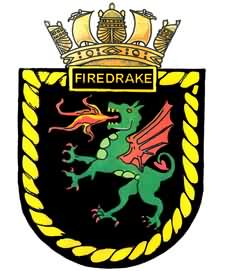 |
|
Lieutenant
D.J.Dampier, RN
senior surviving officer HMS Firedrake |
| Denis
John Dampier was born in Blackheath in 1920 son of Admiral Cecil
Frederick Dampier. Who for a time commanded the Dover Patrol, soon
after his birth his father retired from active service and in 1925
the family moved to Bishops Waltham, where they lived until 1950. Denis attended St Ronan’s preparatory school where Mr. Harris, the headmaster, who was a devout Christian, made a lasting impression on him. He went onto attend Wellington College and entered the Royal Navy in January 1939. Denis always seemed an unlikely candidate for a naval career, his nature being mild and considerate. His interests tended towards pleasures such as sketching and angling and could play the piano to a reasonable level ( the Introit piece - Jesu Joy of Man’s Desiring ) was one of his favorite. Nevertheless he felt it was his duty to join the Royal Navy. |
| He did
and achieved a successful career in the service during and after the
war, rising to the rank of Lieutenant Commander. After the war he
never showed any bitterness towards the Germans despite his experiences. He joined the naval training ship Frobisher in Portsmouth on 1st January 1939, in September 1939 the war broke out, and then in April 1940, Denis joined HMS Fiji, which went to Bermuda, patrolled the Straits of Florida, to the Bahamas and then went on to Scapa Flow. On leaving Scapa Flow they were struck by a torpedo, but managed to get back to the Clyde. He was then transferred to HMS Berkeley one day as she was returning to Chatham she set off an ‘acoustic’ mine which fractured the feed pipes to the turbines. Early in 1941, whilst approaching the Thames Estuary, they saw a yellow Blenheim type aircraft crash into the sea ahead of them. A boat was dispatched to investigate and search for survivors, but nothing was found, except for a suitcase with a label saying the property of Amy Johnson nothing else was recovered. Having seen the incident so close he could never understand the press speculation of her mysterious disappearance and the rumours of her probable survival. |
| In March
1941, Denis joined the Prince of Wales and passed the exams to become
an acting sub-lieutenant so his pay increased from 5/- to 9/- a day.
In January the following year, he was on board HMS Trinidad when she
was ordered to escort convoy PQ8 to North Russia, it was then that
he was involved in an extraordinary incident which was later related
to in a book entitled "The Ship That Torpedoed Herself". It was bitterly
cold and at one point the stars were visible for 36 hours. At the end of March the convoy was engaged in battle by German destroyers, the torpedo officer of the Trinidad fired their port-side torpedoes but only one left the iced up tubes. It ran alongside the ship and turned inwards, torpedoing the Trinidad herself amidships. The damage control crew did a magnificent job, the ship undercover of darkness managed to steam back to the Kola inlet, Murmansk, where they spent four weeks being repaired. Then she sailed for home, on this voyage they were bombed and set on fire so had to abandon ship. The crew were saved from going into the sea by another destroyer that maneuvered alongside so that the crew could clamber onto her, no one would have survived in that freezing Arctic sea for more than a few minutes. |
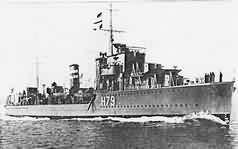 |
This
was the first of three occasions in which Denis had to abandon a ship
shortly before it sank. The second occasion was his very next ship,
HMS Firedrake, which was lost with 168 of her crew in the Atlantic
in December 1942, of which he wrote an article for the Seagoer in
the 1950s called "North Atlantic Rescue" that article will follow
this biography. He later trained as an Aircraft Direction Officer (Navigator) and got his pilots license whilst learning to fly a Tiger Moth, something he was very pleased to have achieved. |
| Shortly after the war he went on a good will tour of Australia. And in the early 1950’s he was on active duty under the United Nations Flag in the Korean War, and was away from home for over 18 months. |
| In 1954, after the war was over, more drama was to come. The troopship Empire Windrush, in which he was returning home, caught fire in the early hours of the morning. The crew were unable to extinguish the flames and the ship lost all power. The order to abandon ship was given, this was the third time he had had to abandon a ship just before it sank. All the life boats had been filled with women and children, so the men had to slide down 60ft ropes into the sea. In the dark, Denis clung onto a piece of driftwood until he found a lifeboat. Later they were picked up by a tramp steamer and landed in Algiers, amazingly only four lives were lost. |
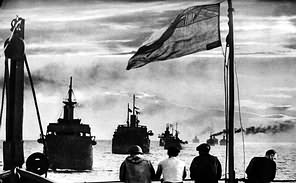 |
| Always
modest about his experiences he very rarely spoke about what he had
seen while serving in the Royal Navy. The latter days with the Navy
were happier, he was loaned to the New Zealand Navy for 20 months,
where he had one of the most enjoyable periods of his professional
life, touring not just New Zealand but also Japan, the Philippines
and other places around Asia. On this trip he won the Rangitoto squash
competition. In 1963 Denis exchanged his naval life for family life. He married Jean on 2nd February at St James in Piccadilly, after a short time in London they moved to Chipperfield in West Clandon where they stayed for 35 years. He secured a job in the Naval Intelligence Division of the Ministry of Defence where he stayed for more than 20 years. Over the next ten years his family increased with the birth of Gerald, James and Cecilia and later to include two daughters-in-law, Wilma and Catherine and a granddaughter Eleanor. |
| He was
an active figure in the parish, a member of the Parish Church Council
and church warden for nine years. Together with Jean they raised money
to build the village tennis court where annual competitions are still
held. After retirement he took an active interest in various charities
and was treasurer of the Surrey branch of the National Garden Scheme
for several years. He taught his two boys to sail and enjoyed holidays. "Swallows and Amazons" style in the family dinghy. His main hobby on leaving the Navy was drawing and painting, particularly local churches. He was asked to illustrate 9 churches for the Guildford Cathedral Trail guide, and his work was also featured on a local calendar and magazines. When Denis was younger he used to enjoy riding, so when his daughter Cecilia became keen, he agreed to let her have her own pony, this meant that on occasions, he had to look after it, mucking out, changing rugs and with Jean taking it to competitions. |
| Life
became more difficult as Denis developed Parkinson’s Disease. He very
rarely complained and bore the gradual loss of mobility with amazing
patience, his last year was made considerably easier by moving to
a bungalow. Sadly Survivor D.J.Dampier died on Christmas day 1999 after suffering briefly from pneumonia. On behalf of the members of the HMS Firedrake Association please can I pass on our condolence’s and take this opportunity to thank Mrs. Jean Dampier for submitting this biography. |
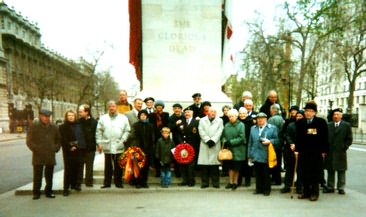 |
|
Some
of the HMS Firedrake association members at the cenotaph 16.12.2001
|
|
North
Atlantic Rescue
By Lieutenant D.J.Dampier,RN |
| In December, 1942 HMS Firedrake was the leader of an escort group covering a westward bound convoy to Canada. For two or three days after leaving Harbour the convoy had proceeded without incident into strong westerly winds increasing hourly, with a rapidly falling barometer. On the 14th it became apparent for various reasons that the convoy was being shadowed by an enemy submarine. During this and the succeeding day sufficient evidence was obtained to show that this U-boat was being supplemented by others to form a wolf pack, and the naval escort was consequently disposed in such a way as seemed best to meet the threat of attack. |
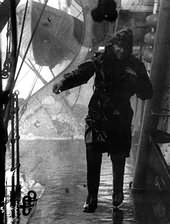 Rough weather |
On
the morning of December 16th, one of the escorting warships made contact
with an enemy submarine ahead of the convoy. This corvette, together
with the destroyer HMS Chesterfield, were immediately detached to
investigate and to attack. This left four escorts directly guarding
the convoy. Meanwhile the wind had in creased to three quarter gale force, with rain and heavy seas, making the work of the lookouts very difficult. At this time the convoy was making good about five knots in a straight westerly direction. About five o’clock in the evening a ship in the forefront of the starboard line was torpedoed and sank rapidly there were few survivors. An hour later an oil-tanker on the port-side vanished in a great red mushroom of smoke and flame. The attacking submarine could not be detected and by seven o’clock it was completely dark except for a half-moon sending fleeting rays of silvery light across the wind-swept sea. |
| At this time Firedrake was in a position well out to starboard of the convoy, with heavy seas spraying her decks all remained quiet until a few minutes past ten when the ship lifted and shuddered to a violent explosion. She heeled over to starboard, and there came the hard grating sound of loose, torn metal. As she righted herself, those in the after part of the ship picked themselves up from where they had been thrown by the explosion and dashed up on deck to see, with horrorstricken eyes, the fore portion of their ship drifting away vertically, stem uppermost into the night. Firedrake had been cut in two one faint light flickered for a minute or so in the forecastle head, before the torn-off bow section dipped in the trough of a wave and vanished beneath the raging icy sea. |
| As they witnessed this appalling spectacle, those in the after part of what a few minutes before had been a live and a happy ship stumbled across the black, storm-swept decks to their own rafts. It was only after a brief interval they realised that the stern section was floating buoyantly on an even keel. A roll-call showed that there remained only thirty five men on board, consisting of the after guns crew the depth-charge parties, and a small number of stewards and officers sleeping aft. None of these however, had any clear idea of the ships position. The commander and the navigating officer had gone with the bridge and bow section of the ship. At first it was felt certain by all onboard that someone in the convoy would have seen the explosion, but when nearly half an hour had passed it was realised that this could not have been the case. Also it was found that the emergency wireless equipment was not workable and that no distress rockets were available in the floating portion of the ship a feeling of helplessness and despondency assailed the survivors. |
| About this time however, someone remembered there were a few rounds of ready to use star-shell illuminate ammunition for the small 3 inch AA gun situated behind the remaining funnel. It was on this gun that discovery and rescue now depended with renewed hope, but in an atmosphere of considerable tension, the gun was aimed at what was thought to be the general direction of the convoy. However after the first shell had been dispatched the weapon jammed, this gun had fired several hundred rounds under differing and often severe conditions in the past few months, and never before had there been a failure, there was no time for retrospection now, the Warrant Gunner who was amongst those on board, immediately got down to the job of getting it repairing. |
| In the
meantime an inspection had taken place of what were now the forward
compartments, and in an attempt at shoring-up was made, as the foremost
complete bulkhead was lying consistently head on into the heavy seas,
which were being violently pounding against, blinding and bitterly
cold showers of spay crossed the upper deck, immense waves swept down
the sides of the broken ship their crests reflecting white in the
moonlight, busting in turn into clouds of spume and spindrift, to
vanish in the darkness astern. The next most important job was to get rid of the depth charges, men in the water have been killed frequently by the explosion of primed depth charges, immersed when carried down by a sinking ship, all on board therefore were made safe and dropped overboard, the torpedoes also were fired as an addition to getting rid of dangerous material, this also had the effect of eliminating unnecessary upper deck weight which might tend to make the ship unstable, this job was completed in just under an hour and almost at once the gunner shouted triumphantly above the roar of the wind, that the gun was again working. |
| The
order was given to fire a star-shell in the direction of the convoy
every ten minutes. The time was now twenty minutes past eleven. Shortly after midnight it was estimated allowing for the fact that Firedrake may have been anything up to five miles on the starboard side of the convoy at the time of being hit, that the convoy might well be fifteen miles distance off the port bow, and receding rapidly into the night, it seemed extremely improbable that with only five escorts left to guard fifty merchantmen there could be any hope of rescue under the prevailing conditions. However the half ship, thanks to the quality of British shipbuilding was still afloat, and everyone onboard was determined to keep it seaworthy until the last possible moment, though there was no fresh water, there were tinned provisions, and several crates of beer in the wardroom. |
| Without
waning something occurred in the blackness of the storm which set
all hearts beating, at first with renewed hope and a second later
with the chill of apprehension, at twenty minutes past midnight a
star-shell burst right overhead, picking out the wreck in brilliant
light, at first it was thought that an enemy submarine had arrived
to finish off its half completed task, because simultaneously another
star-shell landed in the water close beside the ship, in considerable
anxiety one of the crew climbed as high as possible on the after superstructure,
a minute later he reported excitedly a British Corvette on the port
bow. The warship circled the wreck suspiciously, but a frantic S.O.S. was flashed across the sea with torches the only means of signalling and with some rapid morse the situation was quickly clarified. |
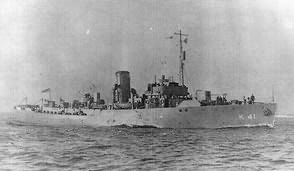 |
By a fortunate mixture of good luck and good judgment the broken Firedrake had been discovered, there had been little radio contact during the voyage, owing to the normal enforcement of wireless silence, but it transpired that exactly two minutes after Firedrake had been hit one of the escorts had occasion to call her on the R.T. and getting no reply had called HMS Sunflower the next senior ship of the escort, informing her of Firedrake’s silence. No action was possible at that moment but the seed of doubt had been sown in the mind of the Sunflowers Captain, at twenty minutes past ten one of the lookouts in Sunflower had observed |
| Firedrake’s
first star-shell, and this confirmed her Captains impression that
"something was up". Turning towards the distant light he proceeded
to investigate. After steaming for an hour he could find nothing, he put the helm over to rejoin the convoy, just as the ship was swinging over a lookout observed the next star-shell on the horizon, fired exactly an hour after the first, when the Firedrake’s gun had been repaired. Turning again the Captain of Sunflower went on to investigate and picked up a small echo on his radar, he approached cautiously not knowing what to expect, and when the Corvette was in suitable range, about twenty past midnight he opened fire with a star-shell, one of these failed to explode but, illuminating in the brilliance of the others he saw what appeared to be a small ship, with one funnel and one mast not unlike another Corvette apparently hove to in the gale. |
| However,
as the light of the star-shells died away the yeoman of the signals
on watch, spelt out Firedrake’s SOS It was too rough for the Sunflower
to come alongside and take the survivors off, as they were deciding
on the best course of action Firedrake gave a sickly lurch and boiling
seas washed across her deck, it was obvious that the half ship was
sinking, a final signal was successfully flashed to the Sunflower
as the survivors launched and clung desperately to the rafts amid
the giant seas. In the darkness and the gale twenty seven men were picked up one of which died before day break. The wind continued to blow with full gale force, and at times with hurricane velocity during the next four days. Even with a life-belt, no one could have lived in that sea for very long, once the solid structure of the half ship had sunk there could have been no hope of detection by radar or visual means, until the sea had abated, had Sunflowers arrival been delayed only ten more minutes there would have been no story to relate. |
|
There's no flowers on a sailors grave
No lilies on an ocean wave The only tribute is the seagulls sweep And the tear drop on a loved ones cheek We shall remember them. |
| Lieutenant D.J.Dampier RN Senior surviving officer HMS Firedrake 17th December 1942. |